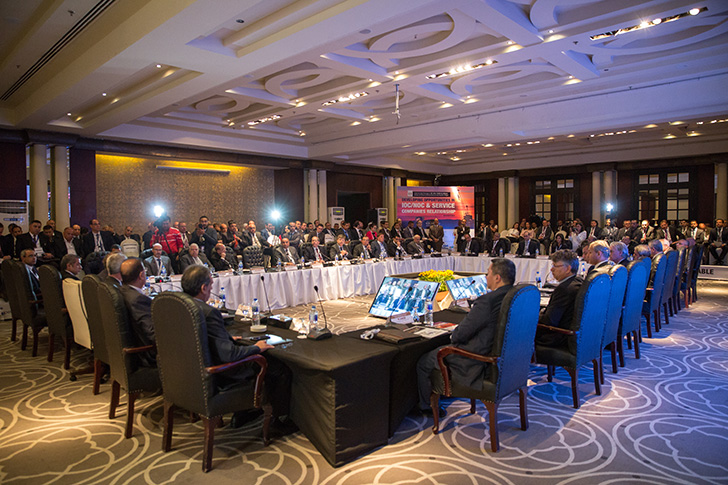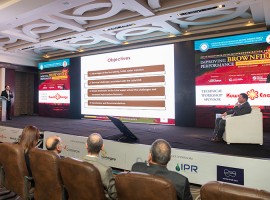By : Salma Essam, Sarah Samir , Mariana Somensi, Nouran Ashraf
With the unprecedented growth the Egyptian oil and gas industry had eyed, a wide range of opportunities are still ahead, with huge potential to move the country forward on the chessboard of the energy industry.
Egypt’s petroleum leaders have shown commitment to provide long-term and effective solutions by timely engagement in debates and discussions over challenges and risks in today’s energy-reliant world. On Thursday May 17th, Sky Executive Resort hosted top energy leaders, CEOs of energy and service companies in a discussion over recommendations and solutions for performance development in the Egyptian oil and gas industry. Under the patronage of H.E Minister of Petroleum and Mineral Resources, Tarek El Molla, and organized by Egypt Oil&Gas, the roundtable event on ‘Developing Opportunities in IOCs, NOCS, and Service companies Relationship’ kicked off, offering fruitful insights on topics of primary concern, namely: Offshore: Mediterranean/Nile Delta & Gulf of Suez, Onshore: Western & Eastern Desert, unconventional, and Industry Collaboration & Relationship Barriers.
In his inaugural speech, Egypt Oil&Gas Managing Director, Eng. Mohamed Fouad extended his welcome to Minister El Molla and further honored his unyielding support to the mission and vision of Egypt oil&gas before displaying a video on the activities and the role played by the technical committee. Country Manager and Director of TransGlobe Egypt, Eng. Brian Twaddle, who moderate the discussion, praised the efforts done by the committee noting that they, the committee, give some of their time because they “believe in Egypt”. “We believe passionately in the future of the sector in Egypt. And we believe that the modernization program can be transformational for the sector,” Twaddle stated.
Collaboration among Industry Stakeholders
The framework of the debate aimed at providing novel and valuable visions to performance development of the oil and gas industry.
In his opening speech, H.E Minister Tarek El Molla encouraged the attendees to exchange knowledge and introduce new visions that can help unlock Egypt’s potential. “We are working together in the same business activities. We have all the same intentions towards having the same task.” H.E Minister, Tarek El Molla, stated addressing the IOCs, NOCs, and service companies’ representatives. He added: “Part of our success is to share [insights] and to contribute together.”
As a matter of fact, the work scope of operators and service companies is rising, with small companies striding huge steps forward. In his presentation, Professor at the American University in Cairo, Dr. Ahmed El Banbi, showcased the production data since 1980 until 2016 in Egypt, highlighting the role each segment plays. In fact, the small companies such as the role NOCs are doing is increasing, taking a big position in Egypt’s energy production capacities. In 2000, major oil companies produced 62% of Egypt’s total production. “Now, we have 39% of production from majors (major companies),” El Banbi said, with the rest of production carried out by small companies. The presentation showed the contribution of small companies in the production activities taking place in the deserts. El Banbi drew the strong link between the discussion and the increase of the work capacities of the small companies, noting: “when we have smaller companies and when we have lots of companies working in the basins of Egypt, we should call for more collaboration between the operators, the service companies, and the national oil companies.”
Technology and Cost Optimization in Offshore Activities
The roundtable discussed the current growth potential of the offshore projects, tackling cost optimization and technological debates.
“This is the high investment, high technology sector of the market,” said Oil Field Services Account Director Schlumberger , Eng. Ismail El Khouly, taking the discussion towards presenting the importance of technology; its planning, design and execution, for offshore drilling operations.
The challenging conditions of deepwaters require “close integration and collaboration between the IOCs, NOCs, and the service providers to ensure that the plans will be achieved in a right way,” affirmed Geologist Mostafa El Bahr. Operators, therefore, withhold expectations and demands from their partnering service provider that would bring in efficiencies through technological solutions.
In heavy expensive industries, top-notch applications of solutions that are substantially manifested in technology are required. Managing Director at Total E&P Egypt, Jean-pascal Clemencon, emphasized: “We need to be able to work with the best technology available,” adding: “If you can save [a] couple of days of rig by using better equipment, even they were more expensive in the first place, it can make a big difference.”
Technology comes hand in-hand with safety measures. In fact, the area of safety is a top priority to major international operators. “We are clear with this priority when we work with any contractor or any service provider,” Vice President North Africa, British Petroleum, Eng. Hesham Mekkawi affirmed.
Cost optimization for offshore drilling operations is an important element to consider in today’s oil prices. From this, efficient partnerships paves way to more investments and profit for parties involved. In this sense, Mekkawi said: “A long term partnership between us [IOCs, NOCs, service companies] is good for the business, industry and the government.”
Equally important; is the capacity of onshore fields and the amount of production taking place on their platforms. It is, therefore, irrational to entirely rely on a specific drilling type because both onshore and offshore have certain advantages over the other.
The second session of the first panel discussed onshore drilling operations, focusing mostly on the Egyptian Western Desert. Apex Energy’s President and COO, Thomas Maher, started the discussion by pointing out that “service companies working in Egypt on onshore have untapped value in both technology and expertise that they offer the onshore operators.” He stated that “Independently, [the smaller operators] are not much, but together resource in production for the country”.
Western Desert and Rich Mysteries
E&P activities in Egypt’s Western Desert have long provided mass production of oil and gas resources, however, there’s still vast unlocked potential to be discovered. In essence, Apache’s Vice President and General Manager, David Chi, said: “Western Desert has been carrying Egypt’s production for many years. We believe there are still lots of opportunities. One of the good things about Western Desert, it is kind of like a premium basin.” Baker Hughes’ Country Director and General Manager Egypt, Sameh Hussien, explained that The Western Desert and the onshore concessions do not just own mature fields as “there are green fields there. The point I want to tackle is how we can get more from the existing.”
Additionally, EPR Group’s President and CEO, M. K. Dabbus, agreed that the desert have a lot of oil and gas wealth explaining: “We always keep on finding additional reserves through these very detailed studies and through applications of improved recovery techniques.”
Together Towards a Productive Industry
Accordingly, small operators can access onshore fields and enhance production through the cooperation with service companies. TransGlobe’s Country Manager and Director, Brian Twaddle, gave an example of his company as the company had an “uneconomic [play that is not producing] even a $100 oil. [Yet], working with the service companies [enabled TransGlobe to] start a lot of fracture stimulation projects and that grew the company’s [production] up to around 12000b/d.” Twaddle highlighted that the company “could not have done that without the relationship with the service company, and that was done very much through conventional contracting,” adding that “we can do better with more creative contracts and risk sharing models.”
Moreover, the roundtable discussed potential future strategies to boost the exploration in the Egyptian onshore fields. Shell’s Development Manager, Layla El Hares, suggested having a joint “database that all [companies] can subscribe to and recycle [their] material, so for example a compressor that [a company] might not need any more or would like to pass on” to be accessible, shared or recycled through this database.
Meanwhile, PICO International’s CEO, David Thomas, added that “every company in the room [should] have the optimal technology in operations in all of its wells and across all of the facilities.” Thomas further proposed that IOCs and NOCs should invite “the service companies into very broad conversations around their assets, because many times individuals in the producing companies will know what they need, but they won’t know what is available to solve their problem.” Thomas continued that the conversations should revolve “around technology to be demand driven rather than supply driven,” adding that E & P companies should “open the invitations to the service companies and have very broad open dialogues to expose the types of problems they have and invite the solutions. I think it has to do with having open discussions.”
Easy Access to Information
According to industry leaders, IOCs, NOCs and service companies should have easy access to data. Baker Hughes’ Director Sales & Marketing, Mahmoud Shawkat, stated an example: “Recently, there was a client in land operations, few months ago, who drilled a well and produced 10mcf/d standard. Today, [this client] is only producing 0.5mcf/d. The information was not as much available at the time, but he realized later that the information should be available so I can find solutions,” adding “the same day we were given the information and during the discussion we found out that three mistakes occurred during drilling and compilation. Now we almost have the solution to intervene and bring back the production from 0.5mcf/d 10m standard cubic feet per day” Shawkat pointed out “We need the information, once the information is available at our hand, the solutions will come quicker than you expect.”
In this regards, Rockhopper’s Country Manager Egypt, Samir Abdel Moaty, said: “Several IOCs like Shell and Apache are working with technology providers to improve the data quality in the Western Desert. In the Western Desert, we are looking forward now either to very small leads and prospects or to very deep [ones], which need better imaging to reduce the risk. This means adding more reserves during the exploration and appraisal time. And that is what we’ll be using later on in the development of the field, which hopefully will increase the production in all areas.”
Therefore, paving the way for service companies to have access to information and building a joint dialogue with them will empower the smaller operators, as well as the giant companies, in order to develop their exploration which will eventually enhance production.
Perfect Path to the Unconventional
AUC Professor, Dr. Ahmed El Banpi and Shell Technical and Development Manager, Ms. Leila El Haris opened the session, stressing the significance of the discussion of the future of the unconventional oil and gas in Egypt with the introduction of the unconventional opportunities from the Apollonia gas field Upper Bahariya oil field, in the Western Desert and oil shale in Eastern Desert.
The roundtable members discussed the areas of collaboration between IOCs, NOCs and service companies when it comes to the introduction of the unconventional, the environmental implications of such new techniques, the economic considerations, the lessons learned that can be applied in Egypt, and finally the academic role in preparing the younger generation of oil and gas engineers.
In order to develop the future of oil and gas in Egypt Dr. El Banpi pointed out to the roundtable members that historically, Egypt used to produce and export a good amount of oil from Gulf of Suez but then Gulf of Suez suffered from decline in production like any mature basin. Later, the Western Desert increased its contribution to Egypt’s oil production and the Nile Delta; the two resources are expected to suffer from decrease in production over time as well. “Every few years we have to find ‘an elephant’ or a new basin to introduce it into production, I personally believe that the new elephant is the unconventional oil” he noted.
Focusing on the importance of learning from the successful case studies and applying it in Egypt Leila El Haris said “The development of the unconventional resources is quite challenging and there have been very little success worldwide except for North America”. She explained that the reason for that is there are key ingredients to be followed in order for the unconventional methods to succeed; that includes having the right geology, tools, service providers, competency and skills, and also the right contract agreements. Baker Hughes Director of Sales & Marketing Egypt Libya and South Sudan, Mahmoud Shawkat stated that in the US the unconventional business wasn’t proven to be economically successful until over 800 unconventional wells were drilled. He explained that the situation in Egypt is different with only three unconventional opportunities , “First we have to drill more wells and study the economics before we can say we have an economical play, we can’t do this now with only two unconventional wells drilled and explored but we have to continue the trial “ Mr. Shawkat concluded. The attendees shared examples from different countries where the infrastructure was similar to Egypt and they were able to gain some success due to the extensive research on exploration and production techniques.
Concession Agreements and Unconventional Resources
The roundtable members discussed the areas of collaboration between IOCs, NOCs, and service companies where they can all work together to convert the unconventional oil and gas resources in Egypt to reserves where they highlighted the significance of sharing of the data and knowledge, Dr. El Banpi suggested that the competitor companies working in the western desert should work together and share the generated data and knowledge from the Apollonia gas field and Upper Bahariya oil field, “Maybe we can carve out Apollonia and Upper Bahariya from the concession agreement and form a giant joint venture between all operators in the western desert in order to focus on testing and developing these resources” he said. Halliburton Egypt & Libya Area Manager, Osama Abdel Halim explained that in order to succeed, operators and service companies should work together to get the data and knowledge that the unconventional business must possess including the subsurface insight, customized chemistry, and the surface efficiency. From his side, EGPC Vice Chairman, Adel Fahmy said that EGPC can aid the collaboration of sharing the knowledge between the companies with respect to the regulatory rules and he confirmed that EGPC is open to providing any company with the information it requests and that EGPC will support all companies in need of understanding the geology of the region.
Highlighting the environmental impact of the unconventional oil gas, SDX Country Manager, Ahmed Moaz said “the idea of fracking sand, like what we did in the western desert, can be entertained. However shale fracking is a very sensitive topic; I think that it will take a long time before a country such as Egypt can embark on this kind of project.” On the other hand, Shell Egypt Deputy Chairman, Moataz Darwish said that shell has globally built on experiences in the US and developed global principles when it comes to water protection, air quality, safety, land use, and dealing with the local communities to make sure that the operation doesn’t negatively affect the environment.
Stressing on the importance of the financial considerations when it comes to the future of the unconventional oil and gas in Egypt, Halliburton Egypt & Libya Area Manager, Osama Abdel Halim said “for the unconventional methods to work you have to study the economics of the unconventional, if you can’t drive the unconventional economics from the cost down you won’t be able to survive”. He explained that that unconventional survived in North America due to the continuous improvements in regards to reducing the cost per BOE. EGAS Chairman, Osama El Bakly said that “when it comes to Apollonia we have to consider the economic aspect due to the shallow depths of the western desert, the challenge is how to develop an economic model in the current technology”
The attendees discussed the success of Apollonia field and how it should be taken as an example of success to encourage more investments, Petroleum Ministry First Undersecretary for Gas Affairs, Mohamed Moanes said that Shell, Apache, and EGPC are all collaborating in the Apollonia gas field, “we can all learn from Apollonia field as a successful example of collaboration in the unconventional exploration and we should move to the second phase to drill more wells.” Schlumberger Marketing Manager, Ismail El Kholy said “The project was executed in collaboration with Khalda with long engagement that took over a year before the launch of the project, where a team of experts from the service providers worked together to involve the global expertise on every level which eventually generated outstanding results. I think the learning curve of this unconventional application was cut down dramatically because of the way it was executed.”
Since the future of the unconventional oil and gas also depends on the new generation of Engineers that will work on the new technology, it is essential to prepare them for such new play in Egypt, Dr. El Banpi said that now we have specific courses offered for oil and gas students that focuses on the unconventional oil and gas education in Egypt and he added that the new academic direction is heading towards collaborative work ,”nowadays students are evaluated for their collaborative effort and skills not just their knowledge” he noted.
Everyone Wins
In collaborative business models, it is important to assure that the interests of all the companies involved are fulfilled. “IOCs, NOCs and service providers should have only one pathway to make their plans come successful, which is: everyone wins,” said Baker Hughes’ Director Sales and Marketing NAF, Mahmoud Shawkat. According to him, if the petroleum firms stick to individual targets, they “would not be progressing in the right direction.”
Tendering Delays
On the contracting side, there are elements of tender processes and proper evaluation that impose a roadblock to the joint schemes. “I think the most important point about tendering process here is the very lengthy process it takes to the joint ventures to award any of these tenders,” SDX Energy’s Country Manager and Director, Ahmed Farid Moaz, explained. “When you want to do a project and you have to wait six months until you finalize your tender processing, it kills the project. There is no way of doing business,” he added.
The Committee pointed out that one of the reasons of tendering delays is the amount of contradicting terms and conditions in the contracts, which drives the companies to ask for clarifications.
In this matter, Shawkat noted that discussions with EGPC had already been held to allow the industry to get some aggregates of tender terms and conditions to agree on previous issues in any tender. As he explained, the goal would be to have global terms, which would avoid cycles of discussions and clarifications on the tendering process and, therefore, save time. “This is a roadblock that had an initiative in the past, but the thought has stopped somewhere. We really need to reactivate this direction,” he advised.
Rockhopper Exploration’s Country Manager, Samir Abdel Moaty, added, “We need this sort of procedures and systems to try to eliminate or at least reduce the amount of time spent on clarifications.”
EGAS’ Vice-Chairman for Operations and EGPC’s Vice-Chairman for Exploration, Magdy Galal, agreed that the NOCs have the responsibility of sending out clear tenders. However, he noted that, sometimes, providers request for clarifications and, afterwards, take a long time to respond again.
“After we receive the clarifications from the providers, one or two weeks later, another service provider asks for more clarifications, and this extends the process. We have some processes in the NOCs that we are working on to improve and shorten the [tendering] process itself, but the service providers also need to respond to us on time in terms of the clarifications they request,” he complemented.
EGAS’ Vice-Chairman for Production, Mohamed Abdel Azim, highlighted the importance of the tendering procedures already ongoing. “We have rules. These rules are a guide to help us go through the tender processing in the proper way and control it, but this is not the cause of the delay or the barrier for this point,” he defended. According to him, the problem is rather due to the culture of the people and the long discussions for clarifications between both sides.
The Ministry’s First Undersecretary for Gas Affair, Mohamed Moenez, disagreed on the government’s responsibility on the tender delays. As he explained, there are indeed adaptations that can be done; however, the companies involved can also engage on a series of actions to speed up the process. “I believe that the way of tendering things is already approved for everybody. What we have as a procedure, I believe it is good. How to reduce the time of tender is between the people from inside the company.”
Moenez mentioned that one measure that the companies could take to accelerate the tendering process is encouraging employees to reach shorter deadlines by giving them bonus. “It does not depend on EGPC only, it depends on everybody,” he stressed.
“We hope to see some improvements in the contracting processes through the Modernization Program,” Moaty concluded.
Workforce Retention
The downturn in oil prices led the petroleum industry to reduce its workforces. According to Mahmoud Shawkat, the reduction might have been easier for IOCs and service providers; however, it imposed great difficulty to the joint ventures. “At a certain point of time, we lost some talents in the Middle East area or in the globe, because our system did lack a retention base pay,” he added.
“With this scenario, we did not lose only unskilled people. We lost a lot of skilled people as well. I do not think people expected the downturn to last that long, and I do not think that anybody has a magic solution for it,” Schulumberger’s VP and General Manager, Hussein Fouad el Gazzawy, said.
The Committee debated on whether a tie between career progression and pay could improve workforce retention in the industry. The Ministry’s Undersecretary for Technical Office, Osama Mobarez, suggested that retention is not just up to the tie between career and pay, but also depends on performance management. “One of the things that we are trying to do in the Modernization Program is to align either the pay or the career progression with the performance management,” he explained.
“We have very good technically talented people, but in the past few years a lot of the top managers have retired, which led to a gap between top management and the young people. So one of the challenges is the managerial skills,” he added.
Furthermore, workforce retention in the oil and gas sector requires the introduction of performance contracts and accountabilities within the entities as well as the people and the employees, as defended by Mobarez. “Is not just pay, it is a package,” he stated.
As the day came into conclusion, all the attendees did agree one thing; Egypt has a huge potential to evolve when it comes to the oil and gas industry, but there should be collaboration between the IOCs, NOCs, and Service Companies to achieve the optimum performance. With the support and facilitations that the government can provide for the corporates, Egypt will sure do accomplish the goals of self-sufficiency, being an exporter and a hub for the region, and above all, a country with modernized oil and gas industry.








